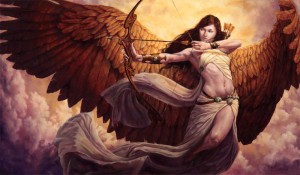 Artemis (Diana) Greek Goddess - Art Picture by Michael C Hayes
Artemis (Diana) Greek Goddess - Art Picture by Michael C HayesArtemis (Roman equivalent is Diana) is one of the oldest, most complex and interesting forms of the Greek pantheon. The Olympian goddess is the daughter of Zeus and Leto, twin sister of Apollo and queen of the mountains, forests and hunting. She also is the protector of small children and animals. The birth of this peculiar goddess is placed on island Ortygia.
Leto, being pregnant, after terrible hardships and wanderings had fled in this barren rocky island in order to hide and protect themselves from the furious persecution of the lawful wife of Zeus, Hera. There, with the help of all female deities (except Hera’s), Artemis was born and shortly after, her brother Apollo followed.
From the first hours of her birth, Artemis started taking initiatives. Although she was a newborn infant, she helped her exhausted mother to give birth to her second child and has been identified in this way with Ilithyia, the goddess of childbirth.
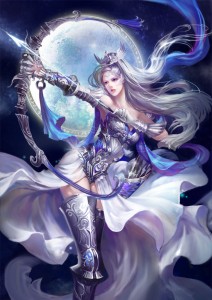 Artemis (Diana) Greek Goddess - Art Picture by jjlovely
Artemis (Diana) Greek Goddess - Art Picture by jjlovelyArtemis was beautiful and brilliant and from very early she had gained the appreciation of other gods. Since the age of three, she had specific requirements relating to the clothing, equipment and the sequence of her most favorite activity, hunting. She was a child who knew what she wanted and was very stable and rigid in her decisions. Zeus admired her for her perseverance and because of her versatility, harbored great affection for her and was satisfying all her desires.
One of the first things Artemis asked as a gift from her father was the eternal purity and virginity.
Being faithful and steady in what she wished and committed to, the maiden goddess never tarnished her ethics or her character. Serious and proud, she maintained her purity, defying any erotic sieges and assaults. Dedicated to hunting and nature, Artemis was unconcerned about the joys of marriage and the pleasures of love. With enforcement and rigor, she demanded innocence and virginity not only of herself but of the Nymphs that surrounded her and also those that honored her with their services.
 Artemis (Diana) Greek Goddess in moonlight - Art Picture
Artemis (Diana) Greek Goddess in moonlight - Art PictureArtemis was a relentless goddess that almost never forgave someone. Any impropriety against her or any deviation from her beliefs and principles deserved her punishment. Her unrelenting fury was ready to erupt at any moment against the violator of her strict rules. Her deadly arrows continuously aimed mortals, gods and heroes who ignored her existence or neglected her principles and worship.
Once, Aktaionas, the son of Autonois and Aristaeus, happened to see Artemis naked, in the time she was taking her bath. The goddess, fearing that the incident would spread, transformed him into a deer and put his fifty dogs that accompanied him to devour him.
In another case, Callisto, daughter of Lycaon (and one of the attendants of Artemis in the hunt) was nearly killed by the arrows of the goddess, because she was seduced by Zeus, had lost her virginity and was pregnant. Additionally, Artemis killed Ariadne, because according to a legend, she was kidnapped and seduced by Theseus in island Naxos.
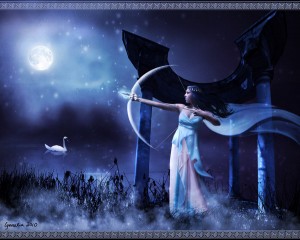 Artemis (Diana) Greek Goddess - Art Picture by Cynnalia
Artemis (Diana) Greek Goddess - Art Picture by CynnaliaArtemis had a soft spot for children and adolescents. Young men and women who maintained their innocence and who lived according to her principles were always favored and were constantly under her protection.
Indeed, Hippolytus, who was dedicated to her and worshiped her, is a living example of this tactic and weakness of the goddess.
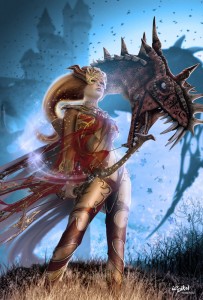 Artemis (Diana) Greek Goddess - Art Picture by Isikol
Artemis (Diana) Greek Goddess - Art Picture by IsikolHippolytus, a keen hunter and horse tamer, had dedicated his life to the beautiful Artemis and the ideals that she professed. No challenge, no woman was ever able to lure him. Not even Phaedra, wife of Theseus, was able to charm and seduce him. His exemplary behavior touched the goddess who gave him prizes, glory and eternal memory to his name after his death. Artemis was one of the most beautiful and most elegant goddesses of Olympus. The ancient Greeks really admired her. They imagined her tall, with graceful beauty, imperious posture and proud walking.
Overall, Artemis was the energetic, hard and restless goddess. In most of her appearances she is conscious, mature and decisive, while very few were those events which show a completely different picture. According to Theomachia (War of Gods), the proud and demanding daughter of Zeus appears as a small immature girl who has to obey, to respect and comply with the requirements of her father’s wife and her brother.
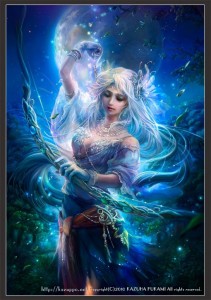 Artemis (Diana) Greek Goddess - Art Picture by Kazuha Fukami
Artemis (Diana) Greek Goddess - Art Picture by Kazuha FukamiFaced with the reluctance of Apollo to duel with Poseidon, Artemis holds a negative attitude and faces the twin brother with ironic, insolent and contemptuous words. Hera, who was present in this incident, was enraged at her behavior and furiously started beating her with her own arrows.
One of the most favorite activities of Artemis was hunting. An active female, impetuous and agile, the free and restless goddess channeled most of her vigor in the search and tracking of games in the mountains. Accompanied by beautiful nymphs and surrounded by wild hounds, she was running through lakes, rivers, meadows and mountains in order to find, primarily, wild animals. Dressed in light clothing and equipped with the appropriate for the occasion equipment, she was throwing herself with excitement and fury in what mainly interested her. Untamed, brutal and imperious, master in the art of archery and a very capable runner and hunter, she was putting her passion to hunting.
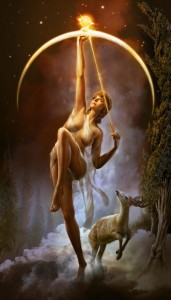 Artemis (Diana) Greek Goddess - Art Picture by Catherine La Rose
Artemis (Diana) Greek Goddess - Art Picture by Catherine La RoseOne of the main features of Artemis was the universal sovereignty of nature. Domestic and wild animals, fish in the water and birds in the air were all under her protection. As goddess and protector of nature, Artemis was considered responsible for both agriculture and for livestock. Areas that worshiped and unfailingly venerated her always had fertile land, dotted fields, bountiful harvest and healthy and fertile animals. In contrast, many of the areas that did not comply properly with their obligations towards her and moreover disregarded her existence had to face the vengeful rage and fury, which meant the destruction of crops and decimated herds.
Admetus and Oineas faced the anger of the goddess, because of the neglect and indifference that showed her towards her. Admetus, at his wedding feast, had forgotten to sacrifice, as required, to Artemis. Artemis, very angry by this irregularity, sent to his bridal bed a herd of snakes, while she prepared to take his life. Apollo tried in vain to calm her. Eventually Admetus persuaded the Fates to spare his life and in return to get someone else's, close to him, life. Only his wife Alcestis willingly offered to this requirement of the Fates. However, in the last moment, the intervention of Heracles (Hercules) saved Alcestis before her soul descended into Hades.
 Artemis (Diana) Greek Goddess - Art Picture by Radiositysg
Artemis (Diana) Greek Goddess - Art Picture by RadiositysgThe woman and the mother of Meleager, could not handle the grief of his death and committed suicide. Finally, his sisters that were incessantly weeping for him were transformed by Artemis into fowls.
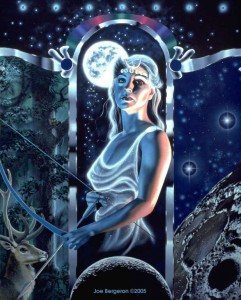 Artemis (Diana) Greek Goddess - Art Picture by JoeBergeron
Artemis (Diana) Greek Goddess - Art Picture by JoeBergeronApart from her participation in all of the above events, the goddess of the hunt takes an active part in one of the twelve labors of Heracles. Heracles was hunting, for a long time, a beautiful doe with golden horns and bronze legs, ownership of the goddess Artemis. Artemis, with the assistance of her brother, Apollo, prevented him from killing the wild animal and urged him to deliver it to King Eurystheus at Tiryns. On receipt of the animal Eurystheus undertakes the task to devote again the animal to her. Just like in the myth of Heracles and so many other incidents, Artemis joins her brother Apollo to reach a goal. In the case of Niobe, who boasted (comparing to Leto) for her many and beautiful children we have the cooperation of the two twins in her punishment. Seven arrows of Artemis and seven of Apollo were sent to her fourteen children and killed them.
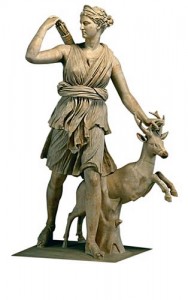 Greek Goddess Artemis (Diana) with a deer Statue
Greek Goddess Artemis (Diana) with a deer StatueIn exactly the same way and for the same reason Artemis killed once the Chioni (Snow, daughter of Daidalionas and lover of Apollo), because she had boasted that her beauty was such that surpassed even that of the beautiful goddess.
The war between Greeks and Trojans did not find Artemis indifferent. Along with her brother Apollo, Ares, Aphrodite and Leto, she was actively involved taking the part of the Trojans.
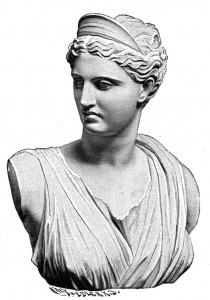 Greek Goddess Artemis (Diana) Statue
Greek Goddess Artemis (Diana) StatueOne of the first events that occurred before even the start of the war was due to the anger and wrath of Artemis. The Greek fleet could not even start due to the absence of strong winds that the goddess had created. A random incident concerning the leader of the Achaean, Agamemnon, had caused this situation. Once, without noticing it, he had invaded in a grove dedicated to Artemis and had killed a sacred deer. The goddess was angered so much that demanded the sacrifice of his daughter Iphigenia to send favorable winds to help the Greek ships sail.
Finally, the wounded by Diomedes during the war, Aeneas, had received the help of Artemis and Leto and had succeeded thanks to them to regain his strength and return to battle.
The symbols of Artemis were many and varied. They ranged from animals and plants and resulted in weapons, goat, deer, bear, dog, snake, laurel, palm, cypress, sword, quiver, javelin and more.
Please leave a comment if you liked this article 🙂
All pictures are also uploaded in Albums on the Greek Mythology Pantheon page on Facebook, visit us at :


26 COMMENTS
wow amazed….
Amazed
wow im amazed…i cant say anything…..
this is amazing
wow im amazed to all photos that ive see in this web site…
Surely one of the most sigmificant and powerfull forms of idoletary and the Bible warns us again and again against idoletary. There is only one GOD.
now people only warship one god but its a mess its the devil people are lazy.
Lol Does the term “mythology” mean anything to you? Seriously, I am a Christian, but study Greek Mythology as a hobby. I love the images, statues, and stories. I don’t worship them by any means, but I find them to be a beautiful work of man-made art. And, you’re right, there is only one God, so long as you are aware that He has many names. I just can’t believe the audacity of some people. By Christian, I mean, I am a God-fearing woman whom believes in the Bible, God, and Jesus. I don’t mean the hypocritical, judgmental sort that are more common than the way God intended for us to be. Must get a grip on this. Btw, if you don’t like the mythology, exactly why are you online looking it up? You know you don’t have to look at it, right?
Pamela, I agree with you wholeheartedly. As a child of nine, I was fascinated in the tales of Greek Mythology; I had a small blue hard-cover I found somewhere and never went anywhere without it…missed my calling. My mother was an Evangelical/Christian/Catholic, (confusing, I know; I was baptized Catholic and am a Christian), I don’t think she was aware of my interests; only knew I was a voracious reader and was prob grateful for that; I became the first of a large family to attend and finish college.
At a time when the planet’s in chaos, animals endangered (we lost 99% of all species 65M years ago; quickly losing more!). Reading this, I vividly remember why I loved it so. I believe we can use mythical gods to interest younger generation (what w/video games, movies, reaching back to antiquity for thematic ideas, etc.)…these kids represent our only hope in preserving the planet in all its diversity.
Just the thoughts of an older, much wiser woman, (who believes in God and science), and dreams of being able to do more for future of our species and our planet.
Thanks for reading this. Have a healthy, happy New Year! (It’s getting harder every year to do that, isn’t it?)
Get a life you bigot
Humans have always loved to be told stories. And mythology is a way of telling stories. There is a very good series on Netflix called Myths and Monsters which is a discussion on the history of mythology. There is a YouTube trailer link here:
https://www.youtube.com/watch?v=jIhMa5J8fZI
rachel and keliyah says wow we are impressed of these goddesses and this information
Beautiful stories suitable for people of all ages! I love these type of stories from my childhood.
true true true
yep
well i have faith in every god there is just one but the others are made by that god and im just 15
I agree with you!
Pieces are falling into it’s place….named Diana, living in a temple in the middle of nature, along a river, intensive hunting-activities all around, healing animals, excellent hunting-dogs that came to me spontaneously, one in Greece, close to the temple of the Oracle of Delphi, and those dogs stay by my side faithfully. Innate ability to spot game (and poachers thereof that are despised of in powerful way) communication with animals, ability to be aware of any presence, human, beast or animal in tens of miles of territory.
she is amzing
she is really cute and i dont know why anyone would have anything agianst her
Really nice internetsite with good information….. Ilove it
I agree with you!
cool
COOL!
I am a pagan, and i worship the goddess Artemis, i believe in her 100%, and have felt her in my life since i was a child, there are many gods and goddess, but i feel a strong connection to her, I know some people dont believe in such things,please dont think for a second that they dont exist , these gods and goddess have been around since before jesus and jehova (ok so i cant spell his name) there are alot of pagans in the world and we all have our own deities, we respect your god , all i ask is that you respect ours too… Have a nice Day and BLESSED BE
Your article mē dēlectat!